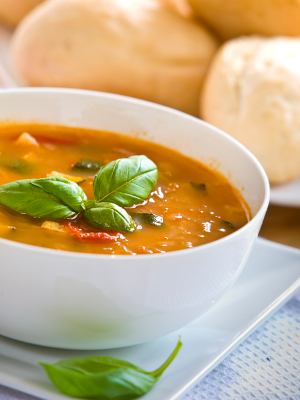Verite Reily Collins writes for 'Having Fun After Cancer!'
At this cold time of year, we get bombarded with advice to take this supplement or that, and to ensure that we are getting extra doses of vitamins. For a cancer patient this can lead to massive amounts of advice from friends and family to take “vitamin X, Y or Z”. Current research, however, says you are unlikely to need extra vitamins, as long as you are eating a sensible, varied diet and you are getting plenty of vegetables and fruit.
 If you don’t think you are getting enough follow the advice of chef, James Martin, on his recent TV programme, Operation Hospital Food: eat warming soup. The beauty of soup is that you can just chuck in more and more veg until you run out!
If you don’t think you are getting enough follow the advice of chef, James Martin, on his recent TV programme, Operation Hospital Food: eat warming soup. The beauty of soup is that you can just chuck in more and more veg until you run out!
However some supplements can be beneficial when undergoing treatment as part of your medical regime. Your doctor or nurse should give you advice as to what and when you may need these, but wave goodbye to expensive pills that are heavily advertised – unless you are given medical advice to take a certain brand.
Where supplements are useful
In all things, there should be a sensible balance, and the UK-based Health Supplements Information Service (HSIS) says overweight and obese people risk suffering from ill health over low vitamin and mineral levels thus supplements may help bridge the nutritional gap.
Older people often face ill health due to a poor diet, particularly if they are undergoing treatment. They can often feel too tired to cook a proper meal, and this starts them on the downward path to poor nutrition. Vitamin and mineral supplements can again help to bridge the gap, but as my pharmacist says, “You must ask for advice, as many of those sold over the counter may not be suitable.”
A recent study by the HSIS says that “…not only is excess weight linked with lower levels of essential nutrients, but… diet or losing weight can result in further nutrition problems.”
So what can you do?
Unless your doctor prescribes extra vitamins, spend the money on fruit and vegetables instead.
If your oncologist does advise taking a supplement, listen carefully. Often the dosage in over-the-counter remedies will not be strong enough and you will need to ensure that you take products containing the right amount of ingredients.
Be aware: companies know that buzz words such as Vitamin C, D or E – or any combination of letters of the alphabet – grab attention but even if you take lycopene instead of tomatoes, the fruits are much better for you, and probably cheaper. If you aren’t keen on tomatoes why not look for tinned tomatoes, tomato paste or even pizza to disguise the taste?
As with everything – taking sensible advice can save you money and give you guidelines of what you need and when you need to take extra vitamins and supplements, if at all. If your doctor doesn’t say that you need supplements, spend your money on fresh fruit and vegetables instead.
What to buy
Have a look for the little Union Flag sticker on apples and pears to identify that they are British. If you buy from supermarkets, ensure they are stocking OUR apples, not ones from overseas, in order to reduce the carbon footprint and prevent racking up extra food miles.
If you are going for a country walk, look out for blackberries; try to pick them from the top of the bushes, because foxes and dogs etc. can lift their legs against lower branches!
If you are cooking brussel sprouts and cabbages etc. think about using the outer leaves for soups, if they are fresh. Celery makes a lovely vegetable ingredient, particularly cooked in stock. A simple and very cheap vegetarian dish combines cauliflower, cheese and milk – by doubling the quantity of the sauce you can use this for a leek bake the next day.
If you have a Farmers’ Market near you, or can access veg box deliveries, you have an inexpensive source of ready-made vitamins just asking to be eaten!








